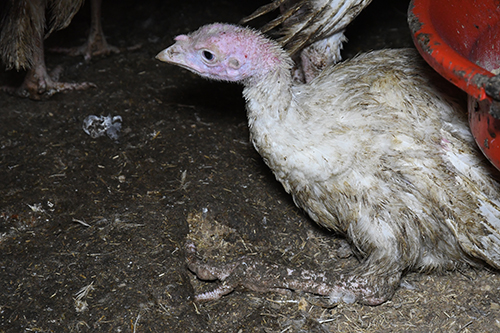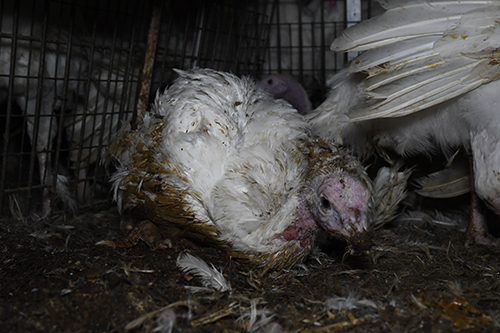WELFARE TURKEYS FORGOTTEN BY THE LEGISLATIVE
In October 2019, GAIA site researchers investigated the situation in three turkey farms in West Flanders. What they found were distressing situations of an unregulated sector: thousands of turkeys packed together, heavily weakened, creaturing and injured, showing all kinds of injuries, turkeys with badly damaged plumage, animals with dead skin on the back and the flanks, carcasses in far advanced state of decomposition, stable floors covered with droppings, turkeys smeared with droppings, ...
"The intensive breeding of turkeys is completely degenerated," says GAIA chairman Michel Vandenbosch. The animal rights organization demands that Flanders imposes strict legal animal welfare standards on the sector in order to put a n end to “this disgusting abuse”. n end to “this disgusting abuse”.
In the last three years, more than 750,000 turkeys have been bred and slaughtered for consumption in Belgium every year. Yet our country has no specific legislation to protect the welfare of turkeys.
The turkey was completely forgotten by the legislator. No clear legal limits are set on stocking density: a breeder himself decides how many turkeys he / she stuffs in a stable.
"Pressing more turkeys together is practically impossible because then hardly any animals would survive and the mortality rate is already so high," emphasizes Michel Vandenbosch.
"The downright abominable to horrible condition that our observers found in the turkey farms visited is the best proof of what the lack of legislation can lead to."
Creative animals After chickens, turkeys are the most slaughtered poultry in Belgium. With 25 farms, the current, intensive turkey farming is situated in Flanders. Wallonia has 2 organic turkey breeders. GAIA filmed the living conditions of meat turkeys in three f arms in Flanders. The situation is terrible: the turkeys live in their own faeces and the faeces of fellow dogs, crowded stables and damaging pecking behavior, among other things because the pecking order has been disturbed by so many animals packed together. GAIA found all sorts of lesions in many turkeys and repulsive necrosis on the head and flanks (dead skin where injuries to the body were inflicted). Because the variety used in intensive turkey farming is selected for rapid growth, turkeys grow so fast (roosters of 170 grams to about 16 kilos in 16 weeks time) that many turkeys suffer from lameness. Some can hardly stand upright anymore, become completely immobile, lie in a staggered position and die of hunger and thirst because they can no longer reach the drinking and feeding trough. The birds also cannot clean their plumage, a vital requirement. "We can assume that the images are representative of the current, intensive meat turkey farming in Belgium," says Vandenbosch. "The whole system is therefore a disgusting mockery of the notion of animal welfare." arms in Flanders. The situation is terrible: the turkeys live in their own faeces and the faeces of fellow dogs, crowded stables and damaging pecking behavior, among other things because the pecking order has been disturbed by so many animals packed together. GAIA found all sorts of lesions in many turkeys and repulsive necrosis on the head and flanks (dead skin where injuries to the body were inflicted). Because the variety used in intensive turkey farming is selected for rapid growth, turkeys grow so fast (roosters of 170 grams to about 16 kilos in 16 weeks time) that many turkeys suffer from lameness. Some can hardly stand upright anymore, become completely immobile, lie in a staggered position and die of hunger and thirst because they can no longer reach the drinking and feeding trough. The birds also cannot clean their plumage, a vital requirement. "We can assume that the images are representative of the current, intensive meat turkey farming in Belgium," says Vandenbosch. "The whole system is therefore a disgusting mockery of the notion of animal welfare."
The current condition of the usual Flemish turkey farms is completely unacceptable. There is an urgent need for specific animal welfare legislation with specific standards to protect the turkey. We ask that the legislator anchors at least the criteria of the first level, 1 star Beter Leven Keurmerk and preferably 2 stars, in legislation. For example, a slower growing breed must be used, more space for the animals, outdoor walking and daylight, and spreading material of sufficient quality must be used. “The welfare of the turkey was completely forgotten by the legislator. This needs to change urgently. "
The organization also hopes that less turkey will be eaten this Christmas. |
 n end to “this disgusting abuse”.
n end to “this disgusting abuse”. arms in Flanders. The situation is terrible: the turkeys live in their own faeces and the faeces of fellow dogs, crowded stables and damaging pecking behavior, among other things because the pecking order has been disturbed by so many animals packed together. GAIA found all sorts of lesions in many turkeys and repulsive necrosis on the head and flanks (dead skin where injuries to the body were inflicted). Because the variety used in intensive turkey farming is selected for rapid growth, turkeys grow so fast (roosters of 170 grams to about 16 kilos in 16 weeks time) that many turkeys suffer from lameness. Some can hardly stand upright anymore, become completely immobile, lie in a staggered position and die of hunger and thirst because they can no longer reach the drinking and feeding trough. The birds also cannot clean their plumage, a vital requirement.
arms in Flanders. The situation is terrible: the turkeys live in their own faeces and the faeces of fellow dogs, crowded stables and damaging pecking behavior, among other things because the pecking order has been disturbed by so many animals packed together. GAIA found all sorts of lesions in many turkeys and repulsive necrosis on the head and flanks (dead skin where injuries to the body were inflicted). Because the variety used in intensive turkey farming is selected for rapid growth, turkeys grow so fast (roosters of 170 grams to about 16 kilos in 16 weeks time) that many turkeys suffer from lameness. Some can hardly stand upright anymore, become completely immobile, lie in a staggered position and die of hunger and thirst because they can no longer reach the drinking and feeding trough. The birds also cannot clean their plumage, a vital requirement.